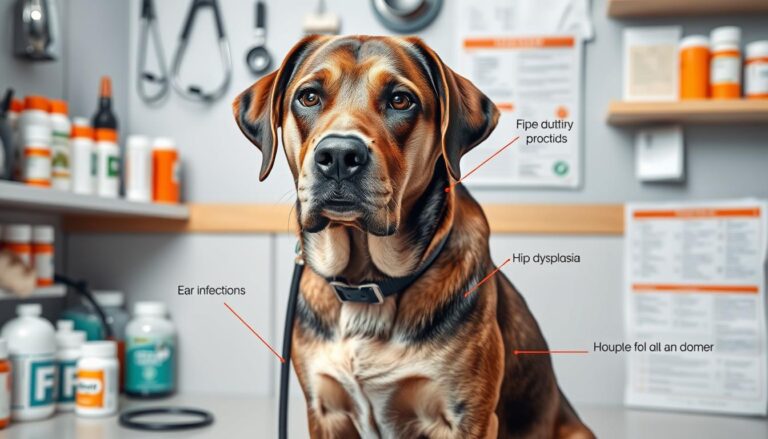Bernese Mountain Dog Health Issues: A Complete Guide
Bernese Mountain Dog Health Issues : If you own a Bernese Mountain Dog, you know how special they are. They are known for their gentle nature and beautiful looks. But, they can face some health problems that need your care and knowledge. This guide will help you understand the common health issues of Bernese Mountain Dogs. It aims to help you keep your pet happy and healthy for a long time.
Table of Contents
Key Takeaways
- Bernese Mountain Dogs face many health issues due to their age, genetics, and body structure.
- It’s important to know about problems like hip and elbow dysplasia, cancer, and bloat to prevent them.
- Regular vet visits, screenings, and a healthy diet and exercise can improve your Bernese’s life.
- Being well-informed and responsible is crucial for the best care of your Bernese.
- With the right care, your Bernese Mountain Dog can live a long, happy, and healthy life with you.
Understanding Bernese Mountain Dog Health Issues
Bernese Mountain Dogs are loved by many for their gentle nature. But, they face health challenges that owners need to know about. It’s important to understand these issues to give them the best care and a good life.
Common Age-Related Health Concerns
As Bernese Mountain Dogs get older, they may face health problems. These include bernese mountain dog joint problems and heart and brain issues. Regular vet visits and watching their health closely can help manage these issues.
Impact of Size and Build on Health
Their big size and strong build can lead to health issues. Their weight and height can hurt their joints, leading to bernese mountain dog joint problems. It’s key to watch their diet and exercise to keep them healthy.
Genetic Predisposition Factors
Bernese Mountain Dogs are prone to certain health issues due to their genes. These can be cancers, skin problems, and brain and metabolic disorders. Good breeding and genetic tests can help lessen these risks.

Knowing about the health challenges of Bernese Mountain Dogs helps owners take care of them. Regular vet visits, a balanced diet, and enough exercise are important. These steps can help these dogs live long, happy lives.
Hip and Elbow Dysplasia: Major Joint Concerns
If you own a Bernese Mountain Dog, you might know about common health issues. Hip dysplasia and elbow dysplasia are big concerns for these joints. They can really affect your dog’s ability to move and enjoy life.
Hip Dysplasia in Bernese Mountain Dogs is a genetic problem. It makes the hip joint not form right, causing pain and stiffness. Dogs might have trouble standing up or seem reluctant to move. Catching it early and treating it right is key.
Elbow Dysplasia is a complex issue with the elbow joint. It can lead to pain, stiffness, and arthritis over time. Dogs might limp, be stiff, or move less than usual.
Doctors use physical checks, X-rays, and sometimes CT scans or MRI to diagnose these problems. They might also test for genetic markers to help breeders.
Treatment for hip and elbow dysplasia can vary. It might include diet changes, exercise plans, and medication. In some cases, surgery like hip or elbow replacement is needed. The right treatment depends on how bad the problem is and what your dog needs.
To prevent these issues, keep your dog at a healthy weight and exercise them right. Genetic testing before breeding can also help. Regular vet visits and watching for any signs of trouble are important for early detection and treatment.

Cancer Risks and Prevention Strategies
Bernese Mountain Dogs face a higher risk of cancer compared to other breeds. It’s important to know the common cancers, spot early signs, and understand treatment options. This helps manage cancer in these dogs.
Most Common Cancer Types
The main cancers in Bernese Mountain Dogs are lymphoma, histiocytic sarcoma, and osteosarcoma. These cancers are aggressive and can affect many parts of the body. Quick medical action is needed.
Early Detection Signs
Watching closely and catching cancer early is crucial for Bernese Mountain Dogs. Look out for these signs:
- Unexplained lumps or growths
- Sudden weight loss or decreased appetite
- Changes in energy levels or lethargy
- Persistent coughing or difficulty breathing
Treatment Options and Prognosis
There are treatments like chemotherapy, radiation therapy, and surgery for cancer in Bernese Mountain Dogs. Early detection and aggressive treatment can improve their chances of living longer.
To lower cancer risk, keep up with vet visits, maintain a healthy weight, and avoid harmful substances. These steps can help prevent cancer in Bernese Mountain Dogs.
Gastric Dilatation-Volvulus (Bloat)
Bernese Mountain Dogs are loved by many, but they face a serious threat called gastric dilatation-volvulus, or bloat. This is when their stomach swells up with gas and can twist, cutting off blood and causing pain. It’s a life-threatening emergency.
Bloat is a critical issue for Bernese Mountain Dogs. It needs quick vet care. Knowing the risks, symptoms, and how to prevent it can help keep your dog safe.
Risk Factors for Bloat in Bernese Mountain Dogs
- Rapid eating and drinking can fill the stomach with air.
- Stress and anxiety can upset digestion.
- Older dogs are at higher risk.
- Some Bernese Mountain Dogs are more likely to get bloat due to their genes.
- Their large, deep-chested body type also increases the risk.
Recognizing the Signs of Bloat
If your Bernese Mountain Dog shows signs like a swollen belly, restlessness, drooling, or vomiting without throwing up, get vet help fast. Bloat can be deadly, and quick action is crucial for a good outcome.
Preventing Bloat in Bernese Mountain Dogs
While we don’t know all about bloat, there are ways to lower the risk for your dog:
- Feed smaller meals more often instead of one big meal.
- Use a puzzle feeder or bowl to slow down eating and drinking.
- Avoid hard exercise before and after meals.
- Think about gastropexy surgery to prevent the stomach from twisting.
By being careful and taking steps to prevent bloat, you can keep your Bernese Mountain Dog healthy and happy.
If you think your Bernese Mountain Dog has bloat, call your vet right away. Quick medical help can save your dog’s life.
Vision and Eye Health Problems
Bernese Mountain Dogs are loved for their beauty and grace. But, they can face eye problems that affect their vision and health. It’s important to watch their eye health closely to keep them happy and healthy for a long time. We’ll look at common eye issues in Bernese Mountain Dogs and why regular vet visits are key.
Progressive Retinal Atrophy
Progressive retinal atrophy (PRA) is a big worry for Bernese Mountain Dogs. It’s a genetic disease that slowly damages the retina, causing blindness. Catching it early is crucial, as there’s no cure. But, early treatment can help keep your dog’s sight for longer.
Cataracts and Treatment Options
Cataracts are a common problem in Bernese Mountain Dogs. They happen when the lens in the eye gets cloudy. Cataracts can be caused by age, genetics, or other factors. If caught early, surgery might help restore your dog’s vision.
Regular Eye Examination Importance
Eye problems are common in Bernese Mountain Dogs. So, regular vet eye exams are vital. These exams help catch issues early and guide treatment. By focusing on your dog’s eye health, you can ensure they live a happy, healthy life.
| Eye Condition | Symptoms | Treatment |
|---|---|---|
| Progressive Retinal Atrophy (PRA) | Gradual vision loss, difficulty seeing in low light | No cure, but managing the condition can help maintain eyesight |
| Cataracts | Clouding of the lens, blurred vision | Surgical removal may be an option to restore vision |
Heart Health and Cardiovascular Issues
Keeping a Bernese Mountain Dog’s heart healthy is key. This breed faces many heart problems that can shorten their life. It’s vital to know about these issues to care for them well.
Dilated cardiomyopathy is a big worry for Bernese Mountain Dogs. It makes the heart muscle weak and big. This can cause the heart to pump less and might lead to heart failure. It’s important to catch it early because it can run in families and is a bernese mountain dog genetic disorder.
Subaortic stenosis is another heart problem for Bernese Mountain Dogs. It narrows the aortic valve, making it hard for blood to flow. Regular vet visits and tests like echocardiograms can spot and track these bernese mountain dog health issues.
Preventing heart problems is important. Keeping them at a healthy weight, feeding them right, and exercising them can help. Also, regular vet visits and early treatment can help manage heart issues. This improves their life quality.
“Caring for the heart health of Bernese Mountain Dogs is a critical aspect of their long-term well-being. With vigilance and a proactive approach, we can help ensure these majestic dogs live their best lives.”
Lifespan Factors and Quality of Life
We love our Bernese Mountain Dogs so much. Knowing what affects their lifespan and quality of life is key to caring for them. Even though they may not live as long as some breeds, we can still make their lives better.
Average Life Expectancy
Bernese Mountain Dogs usually live between 6 to 8 years. But, with the right care, some can live up to 10 years or more. Their genetics, size, and health are important for how long they live.
Factors Affecting Longevity
Several things can affect how long Bernese Mountain Dogs live:
- Genetics: Some genetic issues, like cancer and joint problems, can shorten their life.
- Size and build: Being a large breed means they might not live as long as smaller dogs.
- Diet and exercise: Eating right and staying active can help them live longer.
- Preventive care: Regular vet visits and catching health problems early can also help.
Quality of Life Improvements
Even though Bernese Mountain Dogs may not live as long, we can make their lives better. Here’s how:
- Give them a loving, stress-free home.
- Keep them active and mentally stimulated.
- Deal with health issues quickly to avoid pain.
- Feed them a balanced diet.
- Make sure they get enough exercise and playtime.
By understanding what affects their lifespan and improving their quality of life, we can enjoy every moment with our Bernese Mountain Dogs. They are loving and loyal friends.
Preventive Care and Health Maintenance
To keep your Bernese Mountain Dog healthy, you need to take a proactive approach. Regular vet visits are key to check on your dog’s health and catch problems early. These visits include shots, parasite control, dental care, and full physical checks to keep your dog in top shape.
Feeding your Bernese Mountain Dog the right food is also vital. Talk to your vet to create a diet plan that fits your dog’s needs. This includes their age, how active they are, and any health issues like joint problems or cancer risks. Adding supplements for joint health can help with conditions like hip and elbow dysplasia.
Exercise is also crucial for your Bernese Mountain Dog. These big, active dogs need lots of physical activity. Activities like hiking, swimming, or dog sports keep them happy, healthy, and mentally sharp.
FAQ
What are the most common health issues affecting Bernese Mountain Dogs?
Bernese Mountain Dogs face several health problems. These include hip and elbow dysplasia, cancer, bloat, eye issues, and heart conditions. Knowing about these can help you care for your Bernese better.
How can I prevent or manage hip and elbow dysplasia in my Bernese Mountain Dog?
To fight hip and elbow dysplasia, keep your Bernese at a healthy weight. Give them the right exercise and think about joint supplements. Regular vet visits and early action can also help manage these issues.
What are the most prevalent types of cancer in Bernese Mountain Dogs, and how can I detect them early?
Bernese Mountain Dogs often get cancers like histiocytic sarcoma, lymphoma, and hemangiosarcoma. Watch for early signs like unusual lumps or behavior changes. Regular vet visits can help catch these cancers early.
What is bloat, and how can I prevent it in my Bernese Mountain Dog?
Bloat, or gastric dilatation-volvulus (GDV), is a serious condition where the stomach twists. To avoid bloat, feed small meals often. Avoid hard exercise after eating. Consider a gastropexy surgery for prevention.
What eye problems are common in Bernese Mountain Dogs, and how can I keep my dog’s eyes healthy?
Bernese Mountain Dogs often get eye issues like progressive retinal atrophy and cataracts. Regular eye checks and quick treatment are key. Also, keep their eyes clean and avoid irritants to protect their vision.
What is the average lifespan of a Bernese Mountain Dog, and what factors can impact their longevity?
Bernese Mountain Dogs usually live 6 to 8 years. Genetics, diet, exercise, and care can affect their lifespan and quality of life.
How can I maintain my Bernese Mountain Dog’s overall health and well-being?
To keep your Bernese healthy, focus on preventive care. This includes regular vet visits, vaccinations, good food, and enough exercise. Being proactive about your dog’s health can make their life longer and happier.







